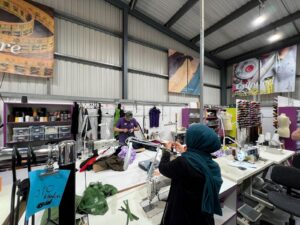NHS Trust calls for a circular economy
NHS Trust calls for a circular economy for healthcare materials to help reduce waste.
In the early stages of the pandemic, 1.7 million single-use face masks were procured by NHS England for the Royal Cornwall Hospitals NHS Trust.
Researchers from the University of Exeter collected data and interviewed staff at the Trust to find out how single-use plastic consumption has been affected by the pandemic.
They found that despite ongoing efforts to reduce waste, there is a need for a ‘circular economy’ for healthcare materials, as this would allow plastics to be reused and remade into other materials.
The Trust, which declared a ‘Climate Emergency’ in March 2020, is currently part of a national trial into using reusable face masks and clinical gowns, with 6,000 fabric reusable masks bought and distributed in November to non-clinical areas in the Royal Cornwall Hospital.

The research team said this highlights the need for investment in technologies and processes that can recycle and reuse a wider range of single-use plastics, and for innovation to find sustainable alternatives to replace single-use consumables.
Lead author Dr Sam Hu, a research fellow at the University of Exeter’s Environment and Sustainability Institute, said: ‘In the face of climate change and the pandemic, we argue that a closed-loop system, also known as the circular economy, must be implemented by the NHS as the only long-term solution to the consumption of single-use plastics in healthcare materials.
‘In the meantime, while Covid-19 has increased the procurement and the use of single-use plastic substantially, the focus of the RCHT on implementing measures to reduce single-use plastic in the long term remains strong – something we found encouraging.’
Roz Davies, care group general manager at the Royal Cornwall Hospitals NHS Trust, said: ‘We continue to process approximately 3,000 single-use masks each day with the long-term aim of using reusable masks for clinical areas. It is hoped that pathways will be in place and the cost will have reduced ready for the introduction into sterile areas, such as theatres, when social distancing regulations are lifted.’
Photo by Mika Baumeister















